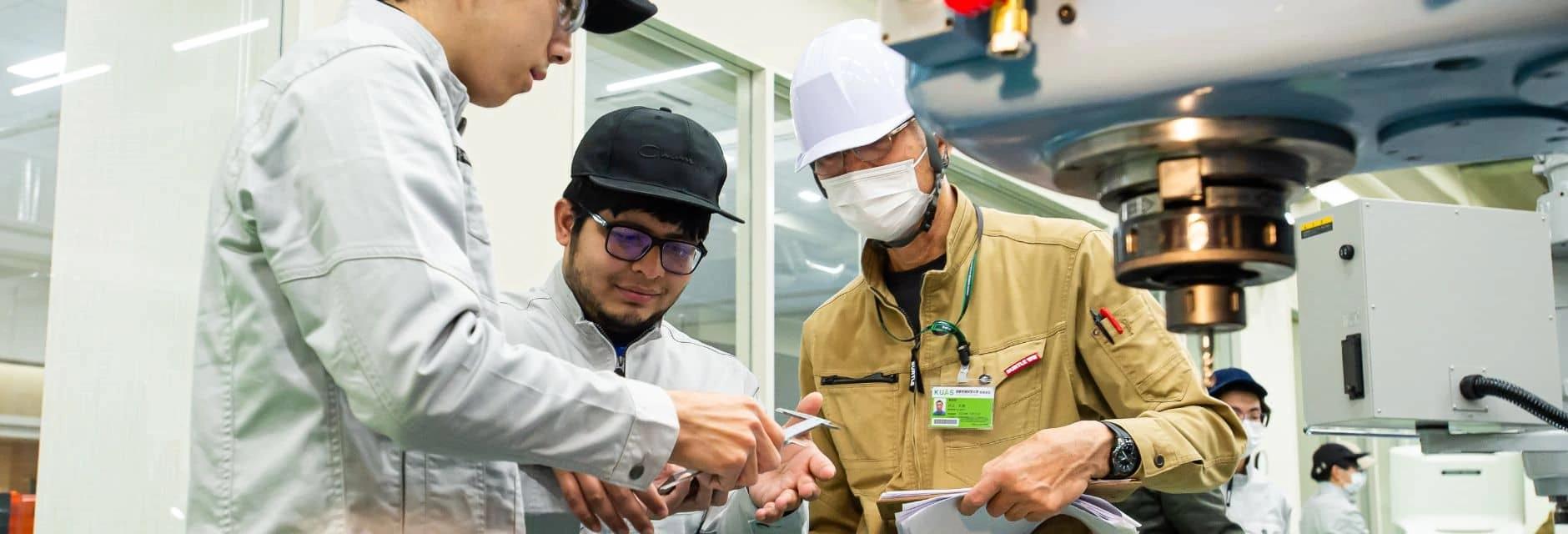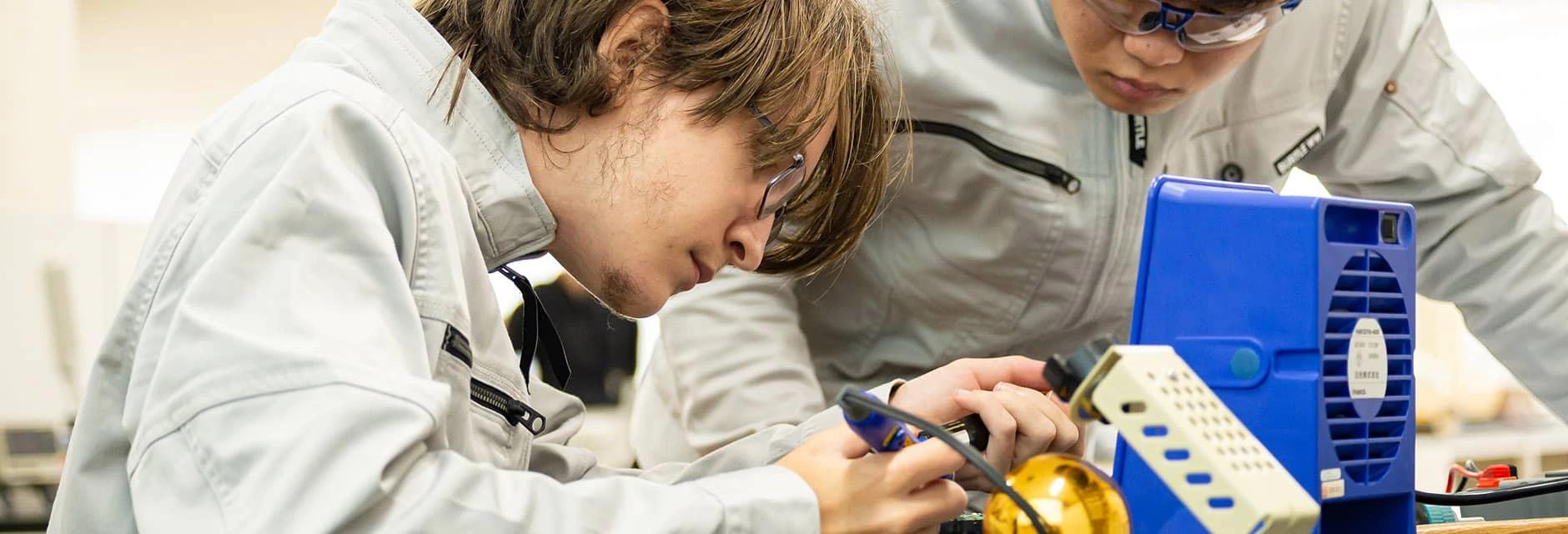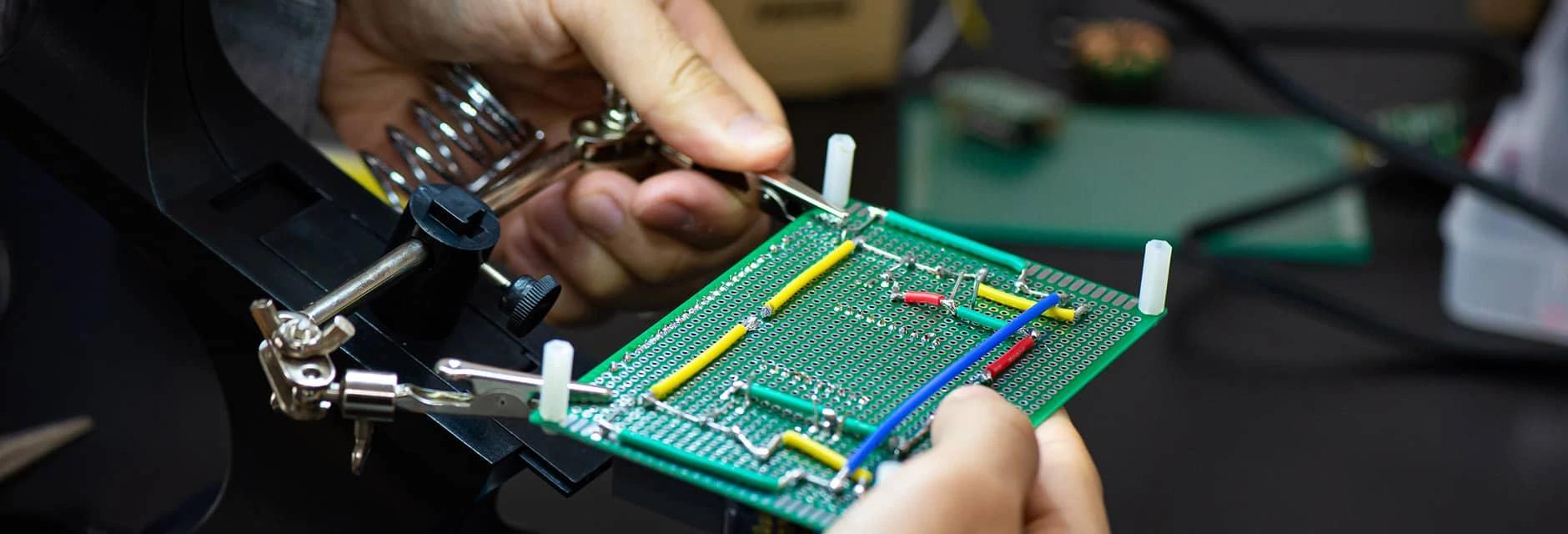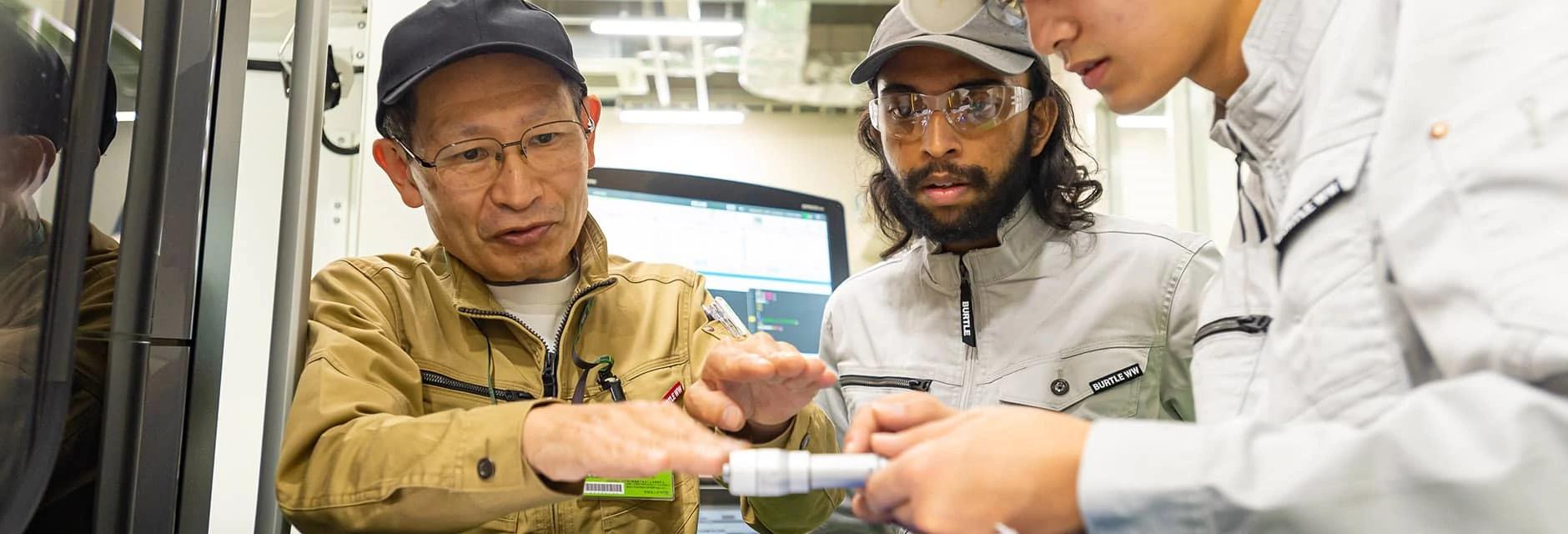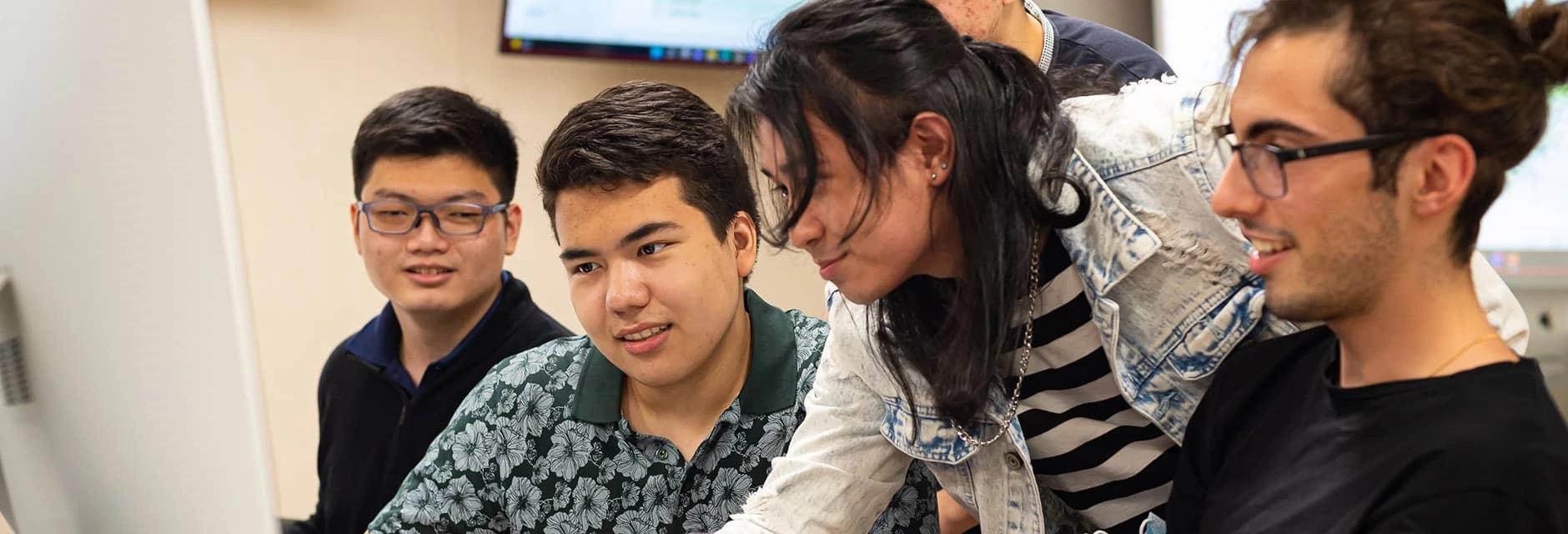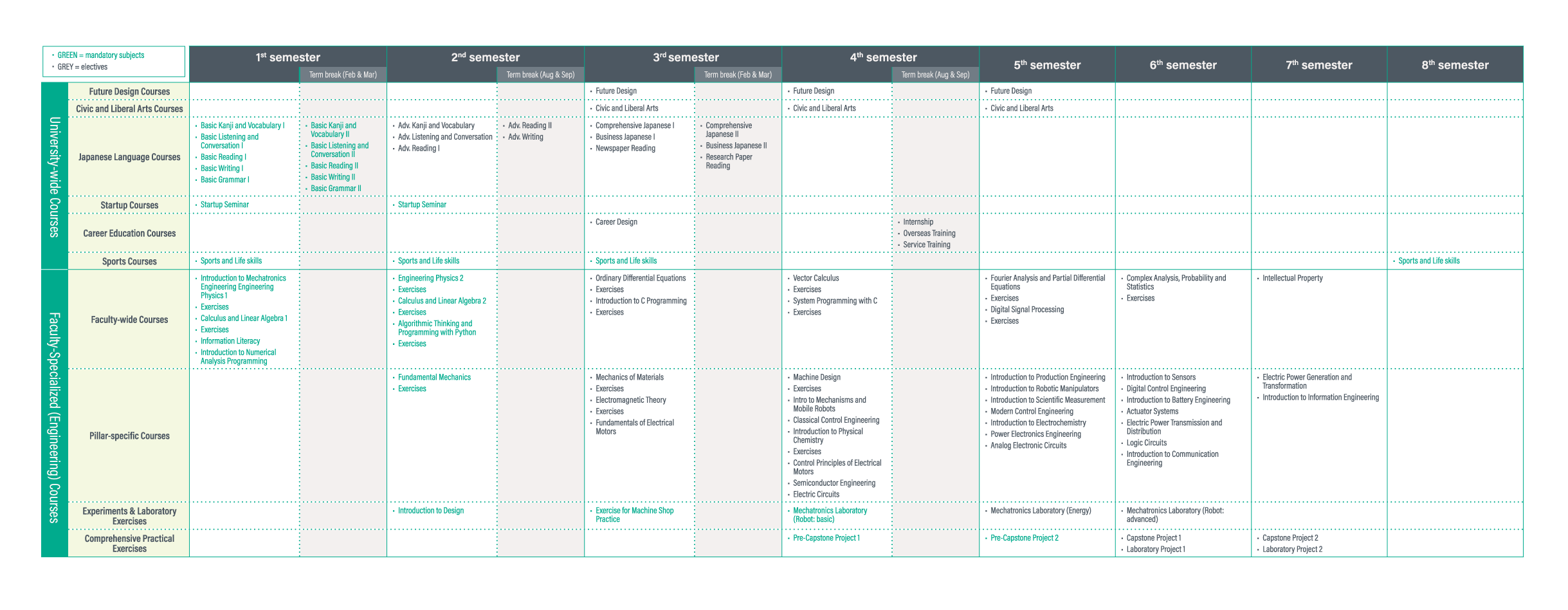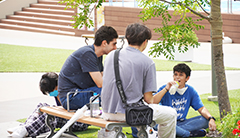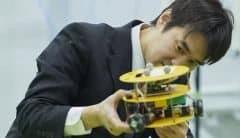Engineering (Undergraduate)
- Introduction
- Key Features
- Field of Study
- Curriculum
- Facilities
- Career
One primary educational objective of KUAS engineering is to interweave theory and practice and apply it to real-world situations. During their studies at KUAS, students will develop their skills and become able to effectively apply them to their future careers.
In their first year, students deepen their knowledge of physics and mathematics fundamental to engineering and master the basics of robot control, programming, and electronic circuits through hands-on training.
In their second year, students learn how to operate various state-of-the-art machine tools and begin their engagement in full-scale manufacturing.
From their 4th semester, students can take part in a capstone project, where they tackle real problems in the engineering field.
Through this practical training, they can test the applicability of the theories and techniques they have acquired.
In addition, students can become specialists in their area of interest through advanced elective courses such as dynamic mechanical systems, courses focusing on software systems and many more. These courses will enable the students to take independent action according to their interests and curiosity and nurture substantial engineering skills that lead to practical and creative solutions.
The Department of Mechanical and Electrical Systems Engineering, Faculty of Engineering focuses on education and research mainly in mechanical engineering, electrical engineering, and electronic engineering, which are included in the conventional mechatronics field. At the same time, the department focuses on fields that fall under the field of mechatronics in the broad sense and which concern new industrial applications, including chemical engineering, materials engineering, and information engineering. By instructing students using this curriculum, the Department of Mechanical and Electrical Systems Engineering seeks to “produce outstanding graduates who can identify and solve the problems of the future”. These “outstanding graduates” should:
- be capable of taking on complex and multifaceted problems by cultivating specialized knowledge, scholarship, and a high level of education, as well as a globally accepted sense of innovation, versatility, and ethics;
- be capable of engaging in cross-disciplinary technical work that spans multiple fields; and
- be able to work while using technical terms in both English and Japanese.
The curriculum of the Department of Mechanical and Electrical Systems Engineering offers the following features to international students:
- Japan’s first Capstone Project in an engineering program
- English-medium instruction in all Engineering Courses
- 472.5 hours of Japanese Language Courses
- 1.5 times more class-time spent learning “Engineering Physics” and “Engineering Math” than other typical engineering programs
- Experience-based hands-on learning
Diploma Policy
The Department of Mechanical and Electrical Systems Engineering, Faculty of Engineering certifies graduation and awards a Bachelor of Engineering degree to students who have been enrolled in the program for four years or more, have earned the required number of credits, and are judged to have acquired the following:
- a body of knowledge in a multidisciplinary engineering field that straddles the fields of mechanical and electrical engineering, while relating it to knowledge in other fields, and use it to solve various problems in a changing global society;
- the ability to gather and utilize necessary information using appropriate methods;
- the ability to communicate with others in Japanese and English about their expertise and opinions;
- the ability to logically construct and express their own ideas through multifaceted thinking by utilizing acquired knowledge, skills, and experience;
- the ability to think logically and critically based on information collected through literature surveys, experiments, etc., and analyze it objectively in response to a self-determined theme;
- an ongoing interest in the problems of a changing global society acquired through learning, and the ability to proactively and persistently solve those problems;
- the ability to act as an autonomous member of society while collaborating with others from diverse backgrounds.
Curriculum Policy
In order to develop human resources with the abilities listed in the Diploma Policy, an education program will be implemented based on the following policies.
- The curriculum shall include University-wide Courses and Faculty-specialized (Engineering) Courses.
- Students shall study Faculty-wide Courses and Pillar-specific Courses (to obtain specialized knowledge and skills) in fields that straddle mechanical engineering and electrical engineering. In this way, students shall develop an ability to search for the truth from multiple perspectives.
The curriculum of the Department of Mechanical and Electrical Systems Engineering consists of “University-wide Courses” and “Engineering Courses (Faculty-specialized Courses in Engineering).
Curriculum Map (Click to enlarge)
1.University-wide Courses
The aim of University-wide Courses is for students to acquire the fundamental ability necessary for learning at university and essential skills required of a member of society.
Japanese language skills, which will be a valuable asset for our students in the future, will be acquired in Japanese Language Courses. Japanese Language Courses are offered intensively until the end of students’ 3rd semester. This allows international students to take liberal arts courses that are taught in Japanese.
In the Startup Courses, students discover problems in their daily lives, gather and share relevant knowledge, and through group discussions and brainstorming, propose, implement, check the effectiveness of, and make presentations and reports on solutions to those problems. By doing so, they will acquire the skills of understanding, inquiry, and expression necessary for acquiring knowledge and conducting research at the university level.
For Career Education Courses, we offer Career Design to students in their 3rd semester. Students learn about the social mission and role of technology from lecturers invited from the industry, and acquire a sense of engineering as a profession, including ethics in career development.
In Sports Courses, students develop teamwork through sports and acquire independence and the ability to understand complex situations. This course is held at the sports facilities of the Kyoto Kameoka Campus.
2.Engineering Courses (Faculty-specialized courses)
The Faculty of Engineering’s specialized courses are categorized into Faculty-wide Courses, Pillar-specific Courses, Experiment and Laboratory Exercises, and Comprehensive Practical Exercises. Furthermore, Faculty-wide Courses and Pillar-Specific Courses are classified into “Basic”, “Applied” and “Advanced” according to their level.
(a)Faculty-wide Courses
Through the study of “Faculty-wide General Courses”, “Engineering Physics Courses”, “Engineering Math Courses” and “Information Processing Courses”, students will acquire the physics, math, and information processing necessary to study specialized knowledge and skills, as well as a sense of mission and ethics as an engineer.
After enrolling, students will first get a general outline of the curriculum to understand the relationship between the courses and their association with the society, the social mission of engineering, and the ethics that being an engineer requires. In addition, information on career paths after graduation will be provided.
During the 1st semester, students will focus on physics and mathematics exercises to acquire a basis for learning Pillar-specific Courses thereafter.
Students will also acquire the fundamentals of the numerical analysis software “MATLAB” and learn basic information processing and programming skills.
In the 2nd semester, students will continue to focus on physics and mathematics as the basis for learning Pillar-specific Courses. Meanwhile, students will learn the programming language Python in order to acquire general programming skills. These Faculty-wide Courses are mandatory.
(b) Pillar-specific Courses
As the core of engineering education in the Department of Mechanical and Electrical Systems Engineering, students will learn specialized knowledge and skills belonging to 13 “pillars”. These pillars include “Design & Production”, “Robotics”, “Instrumentation”, “Control”, “Mechanics”, “Materials”, “Ionics”, “Electromagnetics”, “Actuators”, “Energy”, “Devices”, “Circuits”, and “Communication”, from the 2nd semester.
Basic-level courses are recommended regardless of career path. All applied and advanced-level courses are electives, and it is recommended that students choose elective courses tailored to their academic interests and/or desired career path.
(c) Experiment and Laboratory Exercises
This category provides students with the basic skills necessary for Comprehensive Practical Exercise (e.g., capstone projects) in design, practical training with machines, and mechatronics experiments, as well as a deep awareness of safety and manufacturing.
In the 2nd semester, as an introduction to hands-on training, students can choose one of the following tracks depending on their interests: robot fabrication using Lego Mindstorms, building electronic circuits with microcontrollers, or developing applications on mobile devices.
From the 3rd semester, students will learn the basics of machining and 3D printers by actually using the latest equipment in the Machine Workshop and Science Plaza. The Mechatronics Laboratory Courses, which will be held from the 4th to 6th semesters, will deepen students’’ knowledge and practical skills acquired in Pillar-specific Courses through laboratories and problem-based learning (PBL) related to robotics and energy.
(d) Comprehensive Practical Exercises
Students will participate in a Keystone Project in their 4th and 5th semesters by taking Pre-Capstone Project 1 & 2 as mandatory courses. Successively, in the 6th and 7th semesters, students will take Capstone Project 1 & 2 or Laboratory Project 1 & 2 according to their career path.
A capstone is a stone placed at the top of a pyramid, and in modern day terms, it means “the finishing touch”. In the Capstone Project, a team of 4-5 students applies the knowledge they have obtained in their Pillar-specific Courses to solve a real-life problem faced by a company. In addition to faculty members, engineers and researchers from the company presenting the problem will participate in team meetings with the students to provide guidance from their company’s point of view. By dealing with issues on the frontlines of engineering, students will acquire practical problem-analyzing and problem-solving skills, as well as teamwork and communication skills.
The undergraduate program at KUAS is a four-year program.
To obtain the degree of Bachelor of Engineering from KUAS students must be enrolled at KUAS for a four-year period (eight full semesters of instruction), obtain 128 credits or more from coursework consisting of at least 30 credits from University-wide Courses and 98 credits from Engineering Courses (Faculty-specialized Courses), and complete either the Capstone Project or the Laboratory Project (depending on future career goals).
